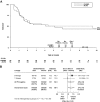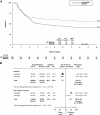T-cell acute lymphoblastic leukemia in adults: clinical features, immunophenotype, cytogenetics, and outcome from the large randomized prospective trial (UKALL XII/ECOG 2993)
- PMID: 19828704
- PMCID: PMC2792210
- DOI: 10.1182/blood-2009-08-231217
T-cell acute lymphoblastic leukemia in adults: clinical features, immunophenotype, cytogenetics, and outcome from the large randomized prospective trial (UKALL XII/ECOG 2993)
Abstract
The biology and outcome of adult T-cell acute lymphoblastic leukemia are poorly understood. We present here the clinical and biologic features of 356 patients treated uniformly on the prospective trial (UKALL XII/ECOG 2993) with the aim of describing the outcome and identifying prognostic factors. Complete remission was obtained in 94% of patients, and 48% survived 5 years. Positivity of blasts for CD1a and lack of expression of CD13 were associated with better survival (P = .01 and < .001, respectively). NOTCH1 and CDKN2A mutations were seen in 61% and 42% of those tested. Complex cytogenetic abnormalities were associated with poorer survival (19% vs 51% at 5 years, P = .006). Central nervous system involvement at diagnosis did not affect survival (47% vs 48%, P = not significant). For 99 patients randomized between autograft and chemotherapy, 5-year survival was 51% in each arm. Patients with a matched sibling donor had superior 5-year survival to those without donors (61% vs 46%, chi(2), P = .02); this was the result of less relapse (25% vs 51% at 5 years, P < .001). Only 8 of 123 relapsed patients survive. This study provides a baseline for trials of new drugs, such as nelarabine, and may allow risk-adapted therapy in patients with poor-prognosis T-cell ALL.
Figures





References
-
- Goldstone AH, Richards SM, Lazarus HM, et al. In adults with standard-risk acute lymphoblastic leukemia, the greatest benefit is achieved from a matched sibling allogeneic transplantation in first complete remission, and an autologous transplantation is less effective than conventional consolidation/ maintenance chemotherapy in all patients: final results of the International ALL Trial (MRC UKALL XII/ECOG E2993). Blood. 2008;111(4):1827–1833. - PubMed
-
- Vitale A, Guarini A, Ariola C, et al. Adult T-cell acute lymphoblastic leukemia: biologic profile at presentation and correlation with response to induction treatment in patients enrolled in the GIMEMA LAL 0496 protocol. Blood. 2006;107(2):473–479. - PubMed
-
- Rowe JM, Buck G, Burnett AK, et al. Induction therapy for adults with acute lymphoblastic leukaemia: results of more than 1500 patients from the international ALL trial MRC UKALL XII/ECOG 2993. Blood. 2005;106(12):3760–3767. - PubMed
-
- Hunault M, Harousseau JL, Delain M, et al. Better outcome of adult acute lymphoblastic leukemia after early genoidentical allogeneic bone marrow transplantation (BMT) than after late high dose therapy and autologous BMT: a GOELAMS trial. Blood. 2004;104(12):3028–3037. - PubMed
Publication types
MeSH terms
Substances
Grants and funding
LinkOut - more resources
Full Text Sources
Other Literature Sources
Medical
Miscellaneous

